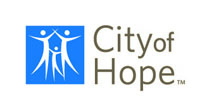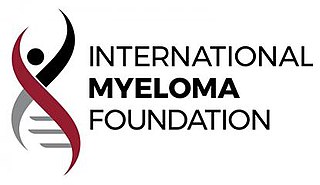The National Cancer Institute (NCI) coordinates the United States National Cancer Program and is part of the National Institutes of Health (NIH), which is one of eleven agencies that are part of the U.S. Department of Health and Human Services. The NCI conducts and supports research, training, health information dissemination, and other activities related to the causes, prevention, diagnosis, and treatment of cancer; the supportive care of cancer patients and their families; and cancer survivorship.

The University of Texas MD Anderson Cancer Center is a comprehensive cancer center in Houston, Texas. It is the largest cancer center in the world and one of the original three NCI-designated comprehensive cancer centers in the country. It is both a degree-granting academic institution and a cancer treatment and research center located within Texas Medical Center (TMC), Houston, the largest medical center and life sciences destination in the world. MD Anderson Cancer Center has consistently ranked #1 among the best hospitals for cancer care and research in the U.S. and worldwide, and it has held the #1 position 20 times in the last 23 years in U.S. News & World Report's Best Hospitals rankings for cancer care. As of 2023, MD Anderson Cancer Center is home to the highest number of cancer clinical trials in the world and has received more NCI-funded projects than any other U.S. institute. In 2024, Newsweek placed MD Anderson at #1 in their annual list of the World's Best Specialized Hospitals in oncology.

Roswell Park Comprehensive Cancer Center is a cancer research and treatment center located in Buffalo, New York. Founded by surgeon Roswell Park in 1898, the center was the first in the United States to specifically focus on cancer research. The center is usually called Roswell Park in short. The center, which conducts clinical research on cancer as well as the development new drugs, provides advanced treatment for all forms of adult and pediatric cancer, and serves as a member of the National Comprehensive Cancer Network. Roswell Park Comprehensive Cancer Center is as of 2019, the only upstate New York facility to hold the National Cancer Institute designation of "comprehensive cancer center".
Takeda Oncology is a biopharmaceutical company based in Cambridge, Massachusetts. It is a fully owned subsidiary of Takeda Pharmaceutical.
Dana-Farber Cancer Institute (DFCI) is a comprehensive cancer treatment and research institution in Boston, Massachusetts. Dana-Farber is the founding member of the Dana-Farber/Harvard Cancer Center, Harvard's Comprehensive Cancer Center designated by the National Cancer Institute, and one of the 15 clinical affiliates and research institutes of Harvard Medical School.
The Multiple Myeloma Research Foundation (MMRF) is a charitable organization dedicated to multiple myeloma, an incurable blood cancer. The MMRF runs as if it were a for-profit business, expecting high returns from the money the organization raises from donors.

Kathy Giusti is a business leader and a healthcare disrupter. She is a two-time cancer survivor having been diagnosed with multiple myeloma and breast cancer. Kathy Co-Founded the Multiple Myeloma Research Foundation where she was CEO and president for nearly two decades. She also co-chaired the Harvard Business School (HBS) Kraft Precision Medicine Accelerator, which she helped found, as a Senior Fellow at Harvard Business School.
NCI-designated Cancer Centers are a group of 72 cancer research institutions in the United States supported by the National Cancer Institute.

Moffitt Cancer Center & Research Institute is a nonprofit cancer treatment and research center located in Tampa, Florida. Established in 1981 by the Florida Legislature, the hospital opened in October 1986 on the University of South Florida's campus. Moffitt is one of two National Cancer Institute-designated Comprehensive Cancer Centers based in Florida. In 2021, U.S. News & World Report ranked Moffitt Cancer Center as a top 30 cancer hospital in the United States.

The European Organisation for Research and Treatment of Cancer (EORTC) is a unique pan-European non-profit clinical cancer research organisation established in 1962 operating as an international association under Belgium law. It develops, conducts, coordinates and stimulates high-quality translational and clinical trial research to improve the survival and quality of life of cancer patients. This is achieved through the development of new drugs and other innovative approaches, and the testing of more effective therapeutic strategies, using currently approved drugs, surgery and/or radiotherapy in clinical trials conducted under the auspices of a vast network of clinical cancer researchers supported by 220 staff members based in Brussels. The EORTC has the expertise to conduct large and complex trials especially specific populations such as the older patient and rare tumours.

City of Hope is a private, non-profit clinical research center, hospital and graduate school located in Duarte, California, United States. The center's main campus resides on 110 acres (45 ha) of land adjacent to the boundaries of Duarte and Irwindale, with a network of clinical practice locations throughout Southern California, satellite offices in Monrovia and Irwindale, and regional fundraising offices throughout the United States.
The Society for Immunotherapy of Cancer (SITC), previously known as the International Society for Biological Therapy of Cancer (iSBTc), is a professional society of scientists, academicians, researchers, clinicians, government representatives, and industry leaders from around the world dedicated to improving outcomes in patients with cancer by advancing the science and application of cancer immunotherapy. Currently, SITC has more than 2,400 members, representing 22 medical specialties from 42 countries around the world, who are engaged in the research and treatment of cancer.
The Addario Lung Cancer Medical Institute is a patient-founded non-profit research consortium established to help make lung cancer a survivable disease. Founded by advanced stage lung cancer patient Bonnie J. Addario, founder of the Bonnie J. Addario Lung Cancer Foundation,.

The International Myeloma Foundation (IMF) is an American non-profit organization serving patients with myeloma, a cancer of plasma cells in the bone marrow. The IMF also provides support and information for family members, caregivers of myeloma patients, physicians and nurses. The organization is dedicated to improving the quality of life for all myeloma patients by focusing on four key areas: research, education, support, and advocacy.
Winship Cancer Institute of Emory University is a nonprofit cancer research and patient care center based in Atlanta, Georgia. Winship Cancer Institute is the only National Cancer Institute-designated Comprehensive Cancer Center in Georgia.
University of Virginia Cancer Center is a National Cancer Institute-designated Comprehensive Cancer Center affiliated with the University of Virginia School of Medicine and the UVA Health System.

Elizabeth M. Jaffee is an American oncologist specializing in pancreatic cancer and immunotherapy.
Steven T. Rosen is the executive vice president and director emeritus of City of Hope's Beckman Research Institute and cancer center. He was previously the provost and chief scientific officer of City of Hope National Medical Center in Duarte, California. In addition to previously directing City of Hope's Comprehensive Cancer Center, he also led the Beckman Research Institute at City of Hope and the Irell & Manella Graduate School of Biological Sciences. Previously (1989-2014), Rosen was the director of the Robert H. Lurie Comprehensive Cancer Center at Northwestern University, which was awarded comprehensive cancer center status by the National Cancer Institute (NCI) in 1997.
Brian G.M. Durie is a Scottish hematologist known for his research and efforts regarding multiple myeloma and blood disorders, especially his development of the multiple myeloma staging system. He is the chairman of the board and Scientific Director for the Myeloma Foundation and a specialist in multiple myeloma and related disorders at the Cedars-Sinai Outpatient Cancer Center at the Samuel Oschin Comprehensive Cancer Institute ..
Irene Ghobrial is an American-Egyptian physician who is a professor at the Dana–Farber Cancer Institute and Harvard Medical School, where her research investigates early detection, mechanisms of disease progression and early interception of multiple myeloma. She is interested in why certain patients with monoclonal gammopathy of undetermined significance (MGUS) and smoldering multiple myeloma (SMM) develop multiple myeloma.








